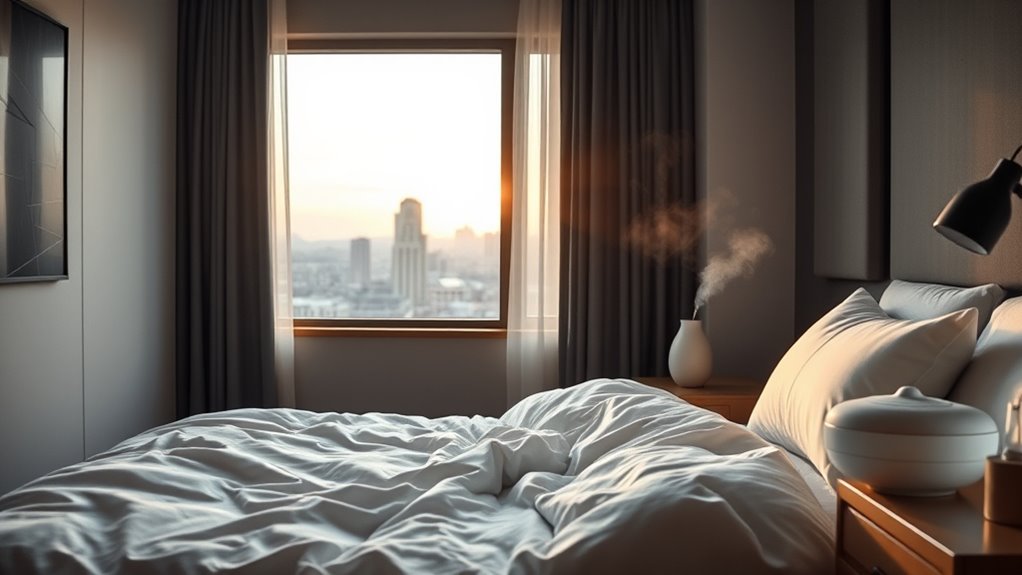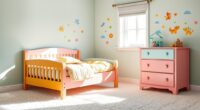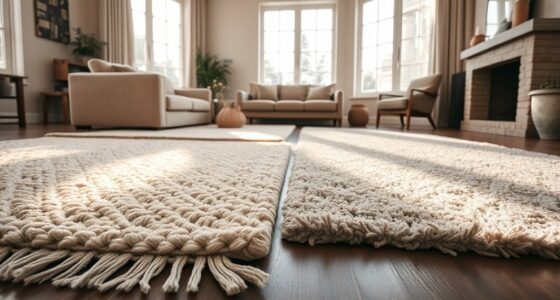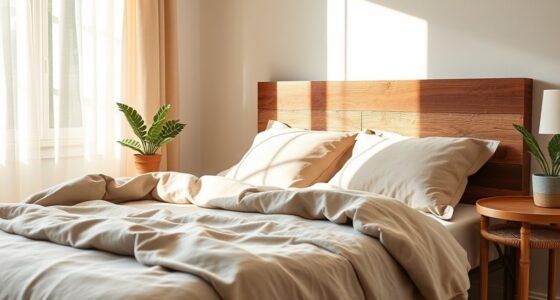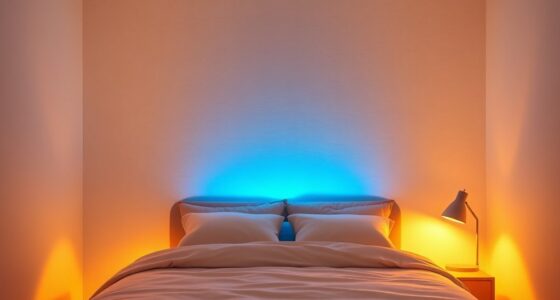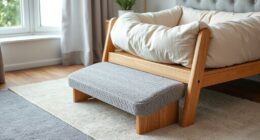Poor acoustics can disturb your sleep by amplifying external noises and causing frequent awakenings. Sudden sounds, even if minor, can fragment your rest, while consistent background noise like white noise can help mask disruptive sounds. Improving your sleep environment with soundproofing, soft furnishings, or sound machines can create a calmer space. If you want to understand more about how acoustics influence your sleep and discover effective solutions, keep exploring the details.
Key Takeaways
- External noises can disrupt sleep by causing awakenings and fragmenting sleep cycles, especially in sensitive individuals.
- Consistent, gentle sounds like white noise reduce abrupt disruptions and promote a more restful, uninterrupted sleep.
- Acoustic modifications such as carpets, curtains, and double-glazed windows absorb sound and minimize external noise intrusion.
- Sound masking creates a uniform acoustic environment, decreasing the brain’s response to sudden or disruptive sounds.
- Combining environmental improvements with behavioral strategies enhances sleep quality by reducing noise sensitivity and arousals.
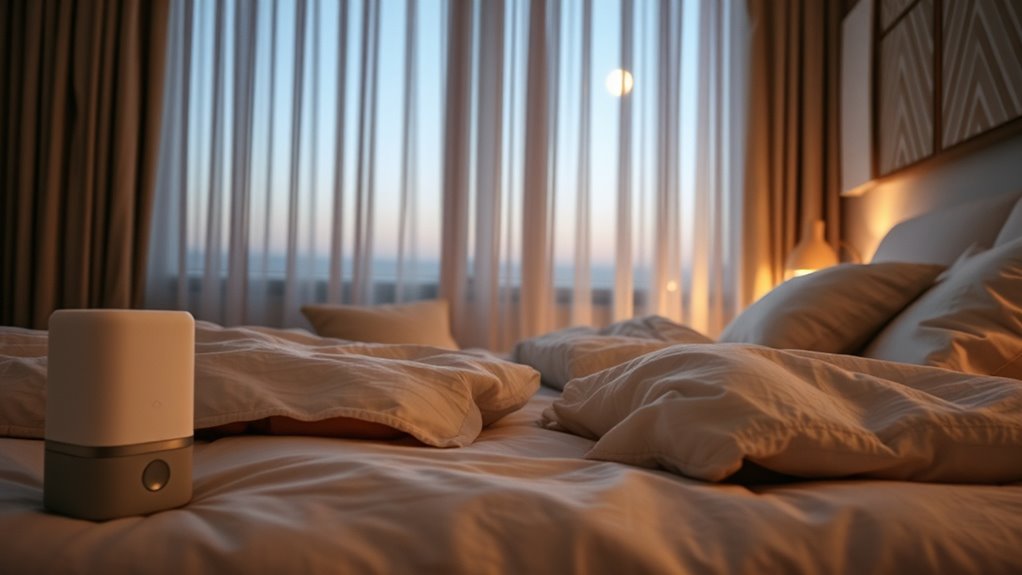
Have you ever wondered how sound affects your sleep? It’s a common question because many people find themselves tossing and turning, disturbed by noises they might not even notice during the day. Your sleep environment plays a vital role, and sound is one of the most influential factors. Understanding how sound impacts your rest can help you create a more peaceful sleep space. One effective strategy is sound masking, which involves introducing a consistent, gentle noise—like white noise, nature sounds, or specialized sound machines—to drown out disruptive sounds. This technique works because it reduces the contrast between background noise and sudden disturbances, making sudden noises less jarring. When your environment is filled with a steady, unobtrusive sound, your brain is less likely to register abrupt noises as threats, leading to fewer awakenings and a more restful sleep cycle.
Noise sensitivity varies widely from person to person. If you’re particularly sensitive to sound, even minor noises like distant traffic, a dripping faucet, or a creaking floor can wake you up or prevent you from falling asleep in the first place. This heightened sensitivity can make it difficult to achieve deep, restorative sleep, and it often results in fragmented sleep patterns. Recognizing your noise sensitivity is the first step toward addressing it. You might find that traditional methods, such as closing windows or using earplugs, help, but they’re not always enough. That’s where sound masking technology can be especially helpful, as it creates a more uniform acoustic environment, making it easier to ignore external sounds. It’s also important to think about your sleep environment’s acoustics—adding soft furnishings, carpets, or curtains can absorb sound and reduce echoes that might amplify noise disturbances.
In addition to sound masking, other solutions like installing double-glazed windows or using white noise generators can markedly improve your sleep environment. If noise sensitivity is a persistent issue, you might also explore behavioral strategies, such as establishing a calming pre-sleep routine or practicing relaxation techniques to lower your overall arousal levels. Keep in mind that improving your sleep environment isn’t just about blocking out noise but also about creating a space that promotes tranquility. By addressing sound influences directly, whether through masking or environmental modifications, you can reduce sleep disruptions and enjoy more restorative rest. Understanding acoustics and sleep can help you identify the most effective solutions for your needs, especially if you’re naturally more sensitive to noise.
Frequently Asked Questions
Can Certain Sounds Improve Sleep Quality?
Yes, certain sounds can improve your sleep quality. White noise creates a consistent background that masks disruptive noises, helping you fall asleep faster. Nature sounds, like gentle rain or waves, promote relaxation and reduce stress, making it easier to stay asleep. By incorporating these sounds into your bedtime routine, you can create a calming environment that enhances your overall sleep experience. Give them a try to see which works best for you.
How Does Background Noise Impact Deep Sleep Stages?
Think of ambient noise as a gentle river flowing beside your sleep pond. It can either soothe or disturb your rest, depending on its flow. Background noise often symbolizes a peaceful presence, but when it’s loud or unpredictable, it becomes a force of sleep disruption. You might find that consistent ambient sounds help drown out sudden disruptions, allowing you to enter deeper sleep stages more easily and enjoy restorative rest.
Are Sleep Noises Different for Light and Heavy Sleepers?
You notice that sleep noises can feel different for light and heavy sleepers. Light sleepers are more sensitive to ambient noise, making their sleep environment easily disturbed by even faint sounds. Heavy sleepers, however, tend to be less affected, often ignoring ambient noise. This difference influences how sound impacts your sleep quality, with light sleepers needing a quieter sleep environment to prevent disruptions and achieve restful sleep.
Do Soundproofing Methods Vary by Room Type?
While your room type influences soundproofing choices, you’ll find options tailored for each space. For bedrooms, consider window treatments that softly block noise without sacrificing light, and wall insulation that gently muffles sounds. In living areas, thicker wall insulation and strategic window coverings help create a tranquil environment. Tailoring your approach guarantees a peaceful space, letting you enjoy serenity regardless of the room’s purpose or layout.
Can Personalized Sound Therapy Enhance Sleep Duration?
Personalized sound therapy can markedly enhance your sleep duration by tailoring sounds to your preferences and needs. When you listen to customized audio, it helps block out disruptive noises and creates a calming environment. This targeted approach can improve your overall sleep quality, allowing you to fall asleep faster and stay asleep longer. By focusing on your unique preferences, personalized sound therapy offers a practical solution for better, longer rest.
Conclusion
Just as a gentle breeze whispers peace to a restless night, controlling acoustics can transform your sleep from chaos to calm. When you silence the clamor, you invite serenity to dwell within your dreams, turning your bedroom into a sanctuary of stillness. Remember, sound is the unseen thread that weaves tranquility or turbulence into your slumber. By mastering acoustics, you hold the key to a night where peace reigns, and your soul awakens refreshed and renewed.
